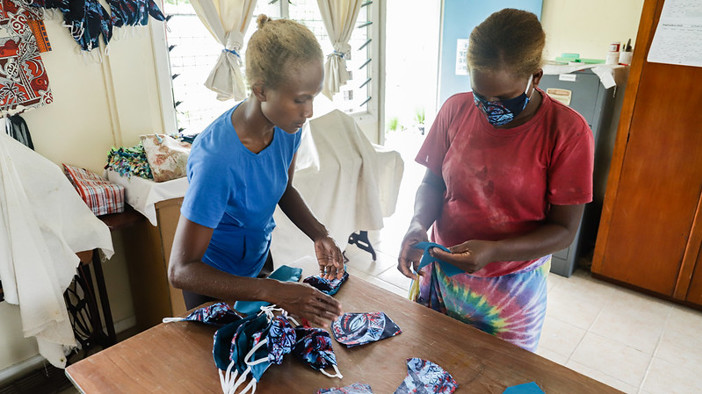The Pacific grapples with the flow-on effects of COVID-19
Caritas Australia's Pacific Program Manager, Emma Dawson, discusses the devastating impact COVID-19 is having on the region, and what Caritas Australia is doing to help.
Q & A with Emma Dawson, Pacific Program Manager, Caritas Australia.
Q – How are Pacific countries faring during the COVID-19 pandemic?
A - In the first year of the pandemic, the Pacific was quite lucky in that most countries almost went a year without any COVID-19 cases. In 2021, we’ve seen really concerning rises in the number of confirmed cases, particularly in Papua New Guinea and Fiji. This has had a big impact on their flailing health systems, poverty levels and their economies, and we have also been seeing a rise in cases of gender-based violence.
At the moment, there are over 17,000 confirmed cases in 22 of PNG’s provinces but we feel that is just the tip of the iceberg of actual cases. There are still fears around COVID-19 testing, as well as difficulties in accessing these tests.
Also of concern is that at this stage there is only an approximate 1% vaccination rate in PNG. There is widespread vaccine hesitancy among communities and difficulty accessing the vaccine in some very remote communities. A lot of misinformation has been going around regarding the vaccine’s safety, its purpose and a lack of education and awareness around it, so it's something we really need to focus on.
See video
Q – How is Caritas Australia supporting the fight against COVID-19?
A - We work through the Church Partnership Program, recognising the very vital role that the churches have to play in Papua New Guinea, in combatting COVID-19. So, through our network of churches, we’ve been developing programs to promote the safety, and importance of the vaccine, really focussing on risk communications, community education and awareness-raising. We’re ensuring that these messages get out into the community, via radio, via community education material, through churches, through schools, in ways that are really accessible to communities.
We also have a new partnership with Catholic Health Services and we receive support for this program from Catholic Health Australia and the generous donations of other community members. So, this involves us working directly with Catholic Church health services which has clinics throughout the country. We have supported Catholic Health Services to access vital personal protective equipment and basic medical supplies and to distribute these across all provinces to very remote areas to ensure that health workers can be protected. We’ll also be supporting them in vaccine rollout over the coming months.
Q – Has the pandemic provided new opportunities and challenges?
A - We’ve seen opportunities arise through the challenges that COVID-19 brings to the way that our programs work. It’s really pushed forward the localisation agenda for us. That means that local communities have been finding their own solutions, implementing these solutions, using local resources and driving their own development.
We have also been able to explore creative, innovative new ways to implement our programs. Due to restrictions, our team haven’t been able to deliver all our programs as intended ie. we haven’t been able to travel to the provinces to conduct activities or hold group training sessions. So, we’ve been using new technology to help us to look at how we can run remote training and remotely monitor our programs and collect data, when we can’t travel to the communities ourselves.
The good news is that activities in PNG are starting to resume, we have the ‘new normal’ of safety, health and hygiene practices in place which are enabling us to get back out into communities and continue our vital work.
Thanks for your generous support, we couldn’t do this work with you and we look forward to continuing to deliver these programs so that we can really make change in the lives of these communities.
Along with your generous support, this program is supported by the Australian Government, through the Church Partnership Program (CPP), Australian Humanitarian Partnership Program and Catholic Health Australia.

Margret Making Cloth Masks In The Solomon Islands. Photo credit: Neil Nuia/Caritas Australia.

















